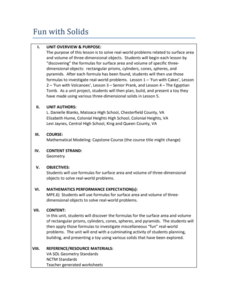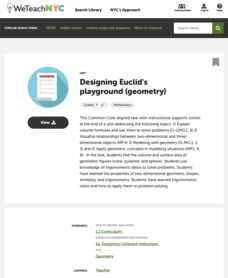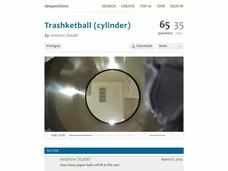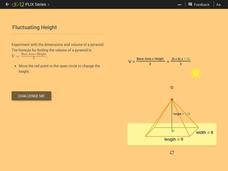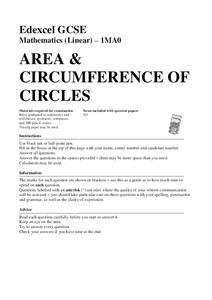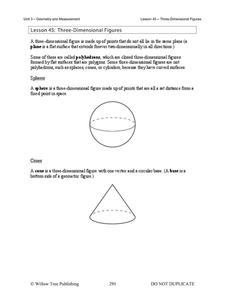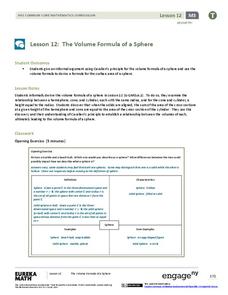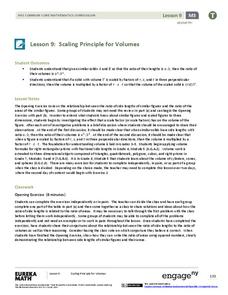Santa Monica College
Introducing Measurements in the Laboratory
We use basic units of measurement to break down things and communicate clearly. The first lesson in an 11-part series teaches the proper way to measure various items. It starts simply with measuring the dimensions and areas of geometric...
Mathematics Assessment Project
Sorting Equations of Circles 2
How much can you tell about a circle from its equation? This detailed lesson plan focuses on connecting equations and graphs of circles. Learners use equations to identify x- and y-intercepts, centers, and radii of circles. They also...
Radford University
Fun with Solids
Unlike a volcano, the lesson won't blow up in your face. Young mathematicians use dried beans to discover the relationship between the volumes of cones and cylinders and to write a formula for the volume of a cone. They then research...
Radford University
Fun with Solids
Cakes offer a yummy way to learn about math. Scholars use manipulatives to discover the formulas for the surface area and volume of prisms and cylinders. They use their formulas to calculate the amount of cake mix and frosting necessary...
Radford University
2 and 3 Dimensional Shapes
Take a similar approach to three dimensions. Pupils develop the relationship between areas of similar objects and see how they relate to the ratio of the sides. Building upon area formulas, small groups put together volume formulas for...
New York City Department of Education
Designing Euclid’s Playground
Create a geometric playground. Pupils work through a performance task to demonstrate their ability to use geometric concepts to solve everyday problems. The accompanying engineering design lessons show teachers how the assessment works...
Mathematics Vision Project
Module 5: Circles A Geometric Perspective
Circles, circles, everywhere! Pupils learn all about circles, central angles, inscribed angles, circle theorems, arc length, area of sectors, and radian measure using a set of 12 lessons. They then discover volume formulas through...
101 Questions
Trashketball
Take a shot using a lesson on volume! Young learners watch a video showing a trashcan filling with paper balls. The task is to calculate the number of paper balls that will fit in the can. Pupils use volume calculations to make a...
101 Questions
Toilet Paper Roll
You won't want to flush a great lesson down the drain! An intriguing resource asks learners to predict the number of sheets of toilet paper on a roll. Presented with the dimensions of the roll and one sheet of paper, scholars make...
CK-12 Foundation
Volume of Pyramids: Fluctuating Height
The height of a pyramid may change, but the usefulness of the interactive will not. Learners drag the apex of a pyramid to change its height. They then answer a set of challenge questions designed to investigate how changing the...
Virginia Department of Education
Surface Area and Volume
Partners use materials to wrap three-dimensional objects to determine the formula for surface area. The groups use an orange to calculate the amount of peel it takes to completely cover the fruit. Using manipulatives, individuals then...
Mathed Up!
Area and Circumference of Circles
Don't go around and around, help your class determine amounts around and in a circle with a video that connects circumference to the perimeter or the distance around an object. The resource includes 14 questions dealing with circles and...
Mathematics Assessment Project
Modeling Motion: Rolling Cups
Connect the size of a rolling cup to the size of circle it makes. Pupils view videos of cups of different sizes rolling in a circle. Using the videos and additional data, they attempt to determine a relationship between cup...
Balanced Assessment
Square and Circle
To determine the dimensional change to quadruple the area, class members determine how to increase the dimensions of a square and a circle to increase the perimeter by a given factor. they then calculate the necessary factor to...
Willow Tree
Three-Dimensional Figures
Time to move into the third dimension! Learn the names of the geometric solids and count faces, edges, and vertices. Then learn to recognize nets that create a given solid.
Del Mar College
Formulas for Elementary and Intermediate Algebra
Give your scholars the support they need to work with formulas. A reference page offers definitions and picture examples of perimeter, area, surface area, volume, the Pythagorean theorem, a variety of shapes, and more.
EngageNY
End-of-Module Assessment Task - Geometry (module 3)
It's test time! Determine your class's understanding of the topics of volume and cross sections with a thorough assessment on volume, area, and geometric shapes.
EngageNY
The Volume Formula of a Sphere
What is the relationship between a hemisphere, a cone, and a cylinder? Using Cavalieri's Principle, the class determines that the sum of the volume of a hemisphere and a cone with the same radius and height equals the volume of a...
EngageNY
The Volume Formula of a Pyramid and Cone
Our teacher told us the formula had one-third, but why? Using manipulatives, classmates try to explain the volume formula for a pyramid. After constructing a cube with six congruent pyramids, pupils use scaling principles from...
EngageNY
Scaling Principle for Volumes
Review the principles of scaling areas and draws a comparison to scaling volumes with a third dimensional measurement. The exercises continue with what happens to the volume if the dimensions are not multiplied by the same...
EngageNY
General Pyramids and Cones and Their Cross-Sections
Are pyramids and cones similar in definition to prisms and cylinders? By examining the definitions, pupils determine that pyramids and cones are subsets of general cones. Working in groups, they continue to investigate the relationships...
EngageNY
Three-Dimensional Space
How do 2-D properties relate in 3-D? Lead the class in a discussion on how to draw and see relationships of lines and planes in three dimensions. The ability to see these relationships is critical to the further study of volume and...
EngageNY
Proving the Area of a Disk
Using a similar process from the first lesson in the series of finding area approximations, a measurement resource develops the proof of the area of a circle. The problem set contains a derivation of the proof of the circumference...
EngageNY
Properties of Area
What properties does area possess? Solidify the area properties that pupils learned in previous years. Groups investigate the five properties using four problems, which then provide the basis for a class discussion.





